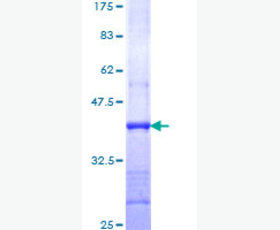Recombinant Human Glucagon/GCG
| Product name: | Recombinant Human Glucagon/GCG |
| Source: | Human Cells |
| Purity: | Greater than 95% as determined by reducing SDS-PAGE. |
| Buffer Formulation: | Supplied as a 0.2 μm filtered solution of 20mM TrisHCl,200mM NaCl,1mM DTT,50% Glycerol,pH 8.0. |
| Applications: | Applications:SDS-PAGE; WB; ELISA; IP. |
| Storage: | Avoid repeated freeze/thaw cycles. Store at 2-8 oC for one month. Aliquot and store at -80 oC for 12 months. |
| UOM: | 100ug/50ug/200ug/1mg/1g |
| Source | Human Cells |
| Description | Recombinant Human Glucagon is produced by our Mammalian expression system and the target gene encoding Arg21-Lys180 is expressed with a 6His tag at the C-terminus. |
| Names | Glucagon, Glicentin, Glicentin-Related Polypeptide, GRPP, Oxyntomodulin, OXM, OXY, Glucagon, Glucagon-Like Peptide 1, GLP-1, Incretin Hormone, Glucagon-like Peptide 1, GLP-1, Glucagon-Like Peptide 2, GLP-2, GCG |
| Accession # | P01275 |
| Formulation | Supplied as a 0.2 μm filtered solution of 20mM TrisHCl,200mM NaCl,1mM DTT,50% Glycerol,pH 8.0. |
| Shipping |
The product is shipped on dry ice/ice packs. |
| Storage |
Store at < -20°C, stable for 6 months after receipt. Please minimize freeze-thaw cycles. |
| Purity |
Greater than 95% as determined by reducing SDS-PAGE. |
| Endotoxin | Less than 0.1 ng/µg (1 IEU/µg) as determined by LAL test. |
| Amino Acid Sequence |
RSLQDTEEKSRSFSASQADPLSDPDQMNEDKRHSQGTFTSDYSKYLDSRRAQDFVQWLMNTKRNR NNIAKRHDEFERHAEGTFTSDVSSYLEGQAAKEFIAWLVKGRGRRDFPEEVAIVEELGRRHADGS FSDEMNTILDNLAARDFINWLIQTKITDRK
|
| Background | Glucagon is a secreted protein and belongs to the glucagon family. Glucagon can be cleved into 8 chains, playing an important role in initiating and maintaining hyperglycemic conditions in diabetes. Glucagon can regulates blood glucose by decreasing glycolysis and increasing gluconeogenesis. In addition, Glucagon is involved in initiating and maintaining hyperglycemic conditions in diabetes. Glucagon release is stimulated by hypoglycemia and inhibited by hyperglycemia, insulin, and somatostatin. In the glucagon antagonist, His-53 and Phe-58 are missing. This antagonist has been successfully utilized to reduce glucose concentration in vivo. |














